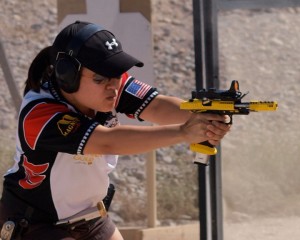 I love me a good tale about gun owners and their psychology, especially those tales which are woven by lofty academics who pretty clearly haven’t been outside of the Ivory Tower for a while. Over at the HuffPo, there’s no clearer example of some of the nonsense of this type. I invite you, dear readers, to go look at part one and part two, of the HuffPo interview with Professor Michael Messner, author of King of the Wild Suburb: A Memoir of Fathers, Sons and Guns. Let me share with you some excerpts from the interview, and discuss why I think his thinking is antiquated, and most decidedly out of touch with the gun culture of today:
I love me a good tale about gun owners and their psychology, especially those tales which are woven by lofty academics who pretty clearly haven’t been outside of the Ivory Tower for a while. Over at the HuffPo, there’s no clearer example of some of the nonsense of this type. I invite you, dear readers, to go look at part one and part two, of the HuffPo interview with Professor Michael Messner, author of King of the Wild Suburb: A Memoir of Fathers, Sons and Guns. Let me share with you some excerpts from the interview, and discuss why I think his thinking is antiquated, and most decidedly out of touch with the gun culture of today:
You write movingly that “those hunting trips with Dad and Gramps were actually about fathers and sons finding a way to love each other. These outings were not so much about hunting for deer: they were about hunting for each other.” You have two sons who are now young adults. Because you gave up hunting before they were born, you never had that as a catalyst to connect with them. Is that a continuing source of sadness? Did you find other less violent ways to bond with them that will stick with them throughout their lives, as your experiences hunting with your father and grandfather have stayed with you?
What exactly is flawed about men bonding through activity? Men and women are somewhat different, I think, in how they form friendships. Men tend to bond with each other more through activity, and I think this is not really different for father and sons. He speaks of this type of bonding as if it were a bad thing, but that strikes me as rather narrow minded.
Part of the tension–and this is really only possible to see in retrospect–is that this 1950s identification with Davy Crockett was very much a pre-civil rights era celebration of white masculinity, and the violent subjugation of the continent from Native peoples, and eventually of the Southwest from Mexico. Still today, in a good deal of popular culture as well as in political debates about gun violence, we tend to think of white guys with guns as protectors and heroes, while reacting with fear to images of black or brown men with guns.
The Professor is making connections that I think only exist in his mind. You can embrace masculinity without racism or sexism. Because some of the people who embraced masculinity in the past, also happened to be racist and sexist, does not mean the two need to be forever connected. This strikes me as incredibly weak thinking for an academic. It also just amazes me we can’t have a discussion about gun ownership with people on the left without bringing up the whole “scared of brown people” motivation for gun ownership.
Well, I guess I’d be surprised to hear that sort of politicized passion about something like hunting coming from a young guy today. However I am happy to see so many young men today — including my sons Sasha and Miles — for whom ideas like equality with women, gay and lesbian people are taken for granted.
Professor Messner is a man living in the past. He’s had his thinking tainted by the left-wing baby boomer culture that focuses heavily on gender, and rejects a flawed conception of masculinity that is entirely of their own making. Would it surprise Messner that “equality with women, gay and lesbian people are taken for granted,” even among many gun owners and hunters today? Would it be such a shock to discover we’ve changed along with the rest of society?
Women are now the fastest growing demographic of gun owners. Most of us have not only been tolerant of this trend, but outright embraced the ideas of women being involved in our sports. Younger men want to share their hobbies with their wives. And why not hunting and shooting as a hobby for a couple to share? Many of us have also either been completely tolerant of gay gun rights groups, or have outright embraced their coming to our cause. I also think I’ve been a vocal advocate for legalizing gay marriage. Does it mean anything that I can announce this on a blog about gun rights without worrying about losing readers?
Get out of the past Professor Messner. We’ve come a long long way since the gun culture of your father and grandfather. The hunting and shooting culture has changed into something more tolerant and inclusive. I would invite Professor Messner to step out of the Ivory Tower of academia for a bit, an attend something like an Steel Challenge or USPSA national competition, and then talk to some of the women shooters about how they view their relationship with firearms, hunting, and shooting through the lens of their gender. Sure, you’ll give them a little chuckle about such a blast-from-the-past question, but some of their answers might just surprise you.


